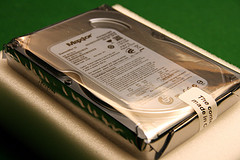
flickr.com/comedynose
Computers have become vital elements in every aspect of our lives. We work, communicate, and entertain through computer technology. They provide a means to read, shop, watch movies, listen to music, and even find true love. So it’s not a far stretch to say that when a computer collapses, its user’s world can come crashing down, too.
It may seem ironic that although computer users at times encounter hard drive recovery problems, only a few of us are aware about hard drive recoveries. When we first discovered the joys of computers, we were led to believe that these were ironclad fortresses that would keep our information perfectly safe. In case of a problem, we believed that hard drive recoveries would be a piece of cake. But then, sadly, a lot of us learned the bitter truth. Data stored on a hard drive is not one hundred percent secured, and hard drive recoveries are not always successful.
The hard drive of a computer is a piece of mechanical engineering that rotates at around 120 times per second. Sometimes this move becomes perpetual motion, with the hard drive spinning relentlessly until the computer is shut down. These pirouetting platters are spinning at such velocity that only a tiny interference in usage can create havoc in a certain zone. Fortunately, hard drive recovery experts have developed a so-called “fail safe hard drive recovery procedures” that help the hard disk to recover when there is small amount of physical threat done to the drive. But problems do happen, so we must be aware of potential critical hard drive recovery failures.
The one concrete truth about hard drive recovery failures is that the real risk to hard drives is the people that operate them. Many computer users are ignorant and simply ignore hard drive recovery. Instead of considering a hard drive recovery, these users would rather go out and buy another hard drive. They’ll employ the Fdisk and other hard drive recovery utilities to prepare and repair a hard drive, when in truth, they’re not even sure what they’re doing. It’s like handing a six year old the keys to the car and telling him to drive himself to school.
Instead of just disregarding hard drive recoveries, people should note that when several areas of the disk drive fail, the hard drive has likely been trashed. A situation similar to this requires the expertise of an expert who is trained in hard drive recoveries. This procedure can be complicated and very expensive, especially to those without the essential skills and knowledge. If you have been prudent enough to create back ups of your data, then your hard drive recovery dilemma will be considerably smaller than most.
Doing successful hard drive recoveries involves following a set of application rules. The most important rule in hard drive recovery is to avoid writing anything further to the affected hard drive. Also, if you have accidentally deleted a partition, creating another partition is not advisable. It’s best just to leave it blank. If you have erased files to your recycling bin, and then realize later that you need them, it’s best not to save anything to the drive. The hard drive does not actually delete data or partitions. When a file is erased from the operating system, it is just labeled on the drive as having been erased. As you save more data on the drive; the system will consider the files as being empty space and copy over them. If this situation happens, it will be less likely that you can expect a successful hard drive recovery.
Computer crashes can be potentially damaging but it if happens to you, all may not be lost. Hard drive recoveries are feasible, but to be successful, this practice is best left to the professionals.
Tagged with: data recovery • hard drive recovery
Filed under: Data Recovery